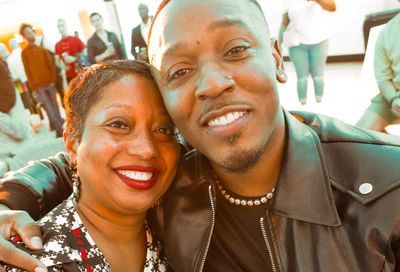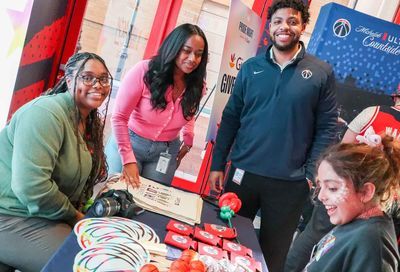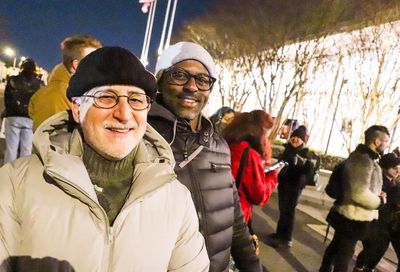State of the Union
Commentary: Center Field
Two kinds of union were celebrated Feb. 12. First, Americans honored the 200th birthday of President Abraham Lincoln, who preserved the union and ended slavery. Second, Rep. Jerrold Nadler (D-N.Y.) and Sen. Patrick Leahy (D-Vt.) observed Freedom to Marry Day by reintroducing the Uniting American Families Act (UAFA) in Congress, and gay couples protested at marriage bureaus across the country. These actions highlighted our nation’s fundamental values and how past struggles inform our own.
The way the past haunts the present was memorably described by Jazz Age novelist F. Scott Fitzgerald in The Great Gatsby: ”So we beat on, boats against the current, borne back ceaselessly into the past.” In an odd confluence of ghosts, that line is etched over the grave of Fitzgerald and his wife Zelda in St. Mary’s churchyard in Rockville, near the spot where Confederate Gen. Jubal Early split his cavalry from his infantry before the Battle of Fort Stevens in 1864.
At Fort Stevens, Lincoln came under enemy fire as he watched the battle from the ramparts. One of the Confederate generals was former Vice President John Breckinridge, who had been a rival of Lincoln’s in the 1860 election. That considerably beats Sen. John McCain’s attacks on the American Recovery and Reinvestment Act last week.
Our nation is not as bitterly divided as it was 150 years ago, and the terrible legacy of slavery is in a class by itself. Yet just as comedian D.L. Hughley said of Inauguration Day, ”America kept a promise,” other marginalized groups call on America to fulfill its promise of equality. Gay families denied equal protection of the law are echoing Chief Justice Earl Warren’s 1967 statement in Loving v. Virginia: ”The freedom to marry has long been recognized as one of the vital personal rights essential to the orderly pursuit of happiness by free men.”
If the simplistic equation of gay rights to black civil rights is objectionable, so is scapegoating gay people for separate problems or injustices, as when former D.C. Delegate to Congress Rev. Walter Fauntroy touted the Federal Marriage Amendment by making the bizarre claim that black men were feminized by slavery.
Happily, Fauntroy is out of synch with current members of the Congressional Black Caucus, including Rep. John Lewis (D-Ga.), who said during the 1996 House floor debate on the Defense of Marriage Act, ”We are talking about human beings, people like you, people who want to get married, buy a house, and spend their lives with the one they love…. I have fought too hard and too long against discrimination based on race and color not to stand up against discrimination based on sexual orientation.”
The support by civil-rights leaders like Lewis, one of 80 initial House co-sponsors of UAFA (there are 14 Senate co-sponsors), is something on which to build. Feb. 12 also marked the 100th anniversary of the NAACP, the nation’s oldest civil-rights organization, which last year made Benjamin T. Jealous its youngest president ever. His call for a human-rights focus for the NAACP, and his background in journalism and political science rather than the traditional path through the church, suggest an opening to fresh perspectives and approaches.
Indeed, the NAACP recently revised its internal EEO policy to include sexual orientation and gender expression; and its new vice president for development is Maxim Thorne, former chief operating officer of the Human Rights Campaign and HRC Foundation. A new generation is getting into the game.
The support for No on 8 by NAACP leaders in California, where Jealous lived prior to his selection, offers hope for further collaboration but requires reciprocity. Fighting by ourselves, we fall short. Alternatively, we can see that Jealous’ concerns about gender and racial disparity in the criminal-justice system, inequities in the schools, and urban violence are our issues as well.
Coalition efforts were on display Feb. 12 in a media conference call on UAFA when Mexican American Legal Defense and Educational Fund Legislative Staff Attorney John Amaya joined Nadler, Immigration Equality Executive Director Rachel B. Tiven, HRC President Joe Solmonese, and two binational couples who face forcible separation under existing immigration laws.
As President Obama said in Springfield, Ill., on Feb. 12, ”There are certain things we can only do together. There are certain things only a union can do.” Get in the game.
Richard J. Rosendall is a writer and activist whose work has appeared on Salon.com and the Independent Gay Forum, www.indegayforum.org. He can be reached at rrosendall@starpower.net.
Support Metro Weekly’s Journalism
These are challenging times for news organizations. And yet it’s crucial we stay active and provide vital resources and information to both our local readers and the world. So won’t you please take a moment and consider supporting Metro Weekly with a membership? For as little as $5 a month, you can help ensure Metro Weekly magazine and MetroWeekly.com remain free, viable resources as we provide the best, most diverse, culturally-resonant LGBTQ coverage in both the D.C. region and around the world. Memberships come with exclusive perks and discounts, your own personal digital delivery of each week’s magazine (and an archive), access to our Member's Lounge when it launches this fall, and exclusive members-only items like Metro Weekly Membership Mugs and Tote Bags! Check out all our membership levels here and please join us today!





















